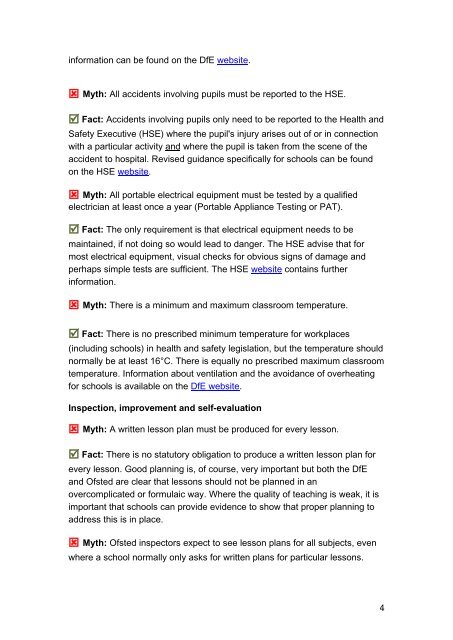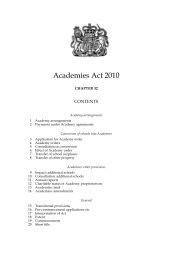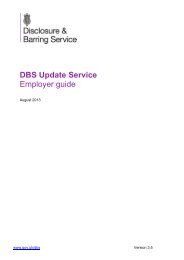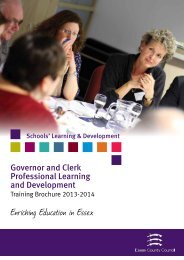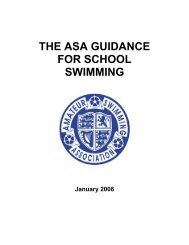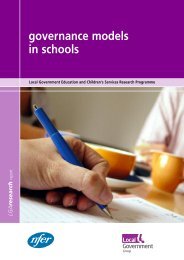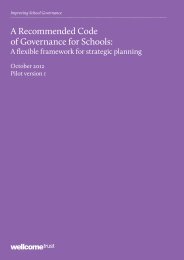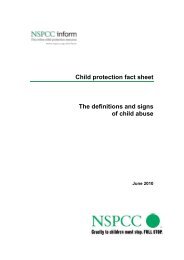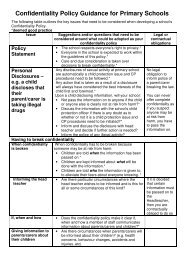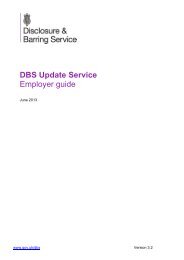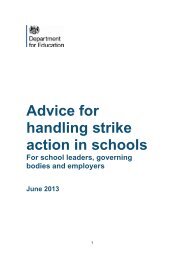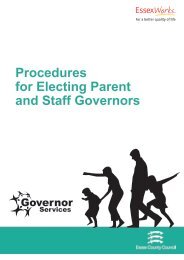Myths and facts for schools DfE updated 1 ... - the Essex Clerks
Myths and facts for schools DfE updated 1 ... - the Essex Clerks
Myths and facts for schools DfE updated 1 ... - the Essex Clerks
Create successful ePaper yourself
Turn your PDF publications into a flip-book with our unique Google optimized e-Paper software.
in<strong>for</strong>mation can be found on <strong>the</strong> <strong>DfE</strong> website.<br />
Myth: All accidents involving pupils must be reported to <strong>the</strong> HSE.<br />
Fact: Accidents involving pupils only need to be reported to <strong>the</strong> Health <strong>and</strong><br />
Safety Executive (HSE) where <strong>the</strong> pupil's injury arises out of or in connection<br />
with a particular activity <strong>and</strong> where <strong>the</strong> pupil is taken from <strong>the</strong> scene of <strong>the</strong><br />
accident to hospital. Revised guidance specifically <strong>for</strong> <strong>schools</strong> can be found<br />
on <strong>the</strong> HSE website.<br />
Myth: All portable electrical equipment must be tested by a qualified<br />
electrician at least once a year (Portable Appliance Testing or PAT).<br />
Fact: The only requirement is that electrical equipment needs to be<br />
maintained, if not doing so would lead to danger. The HSE advise that <strong>for</strong><br />
most electrical equipment, visual checks <strong>for</strong> obvious signs of damage <strong>and</strong><br />
perhaps simple tests are sufficient. The HSE website contains fur<strong>the</strong>r<br />
in<strong>for</strong>mation.<br />
Myth: There is a minimum <strong>and</strong> maximum classroom temperature.<br />
Fact: There is no prescribed minimum temperature <strong>for</strong> workplaces<br />
(including <strong>schools</strong>) in health <strong>and</strong> safety legislation, but <strong>the</strong> temperature should<br />
normally be at least 16°C. There is equally no prescribed maximum classroom<br />
temperature. In<strong>for</strong>mation about ventilation <strong>and</strong> <strong>the</strong> avoidance of overheating<br />
<strong>for</strong> <strong>schools</strong> is available on <strong>the</strong> <strong>DfE</strong> website.<br />
Inspection, improvement <strong>and</strong> self-evaluation<br />
Myth: A written lesson plan must be produced <strong>for</strong> every lesson.<br />
Fact: There is no statutory obligation to produce a written lesson plan <strong>for</strong><br />
every lesson. Good planning is, of course, very important but both <strong>the</strong> <strong>DfE</strong><br />
<strong>and</strong> Ofsted are clear that lessons should not be planned in an<br />
overcomplicated or <strong>for</strong>mulaic way. Where <strong>the</strong> quality of teaching is weak, it is<br />
important that <strong>schools</strong> can provide evidence to show that proper planning to<br />
address this is in place.<br />
Myth: Ofsted inspectors expect to see lesson plans <strong>for</strong> all subjects, even<br />
where a school normally only asks <strong>for</strong> written plans <strong>for</strong> particular lessons.<br />
4


